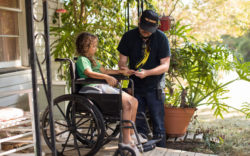When I gave birth to my daughter eight years ago, the choices prepping me for the big day were pretty clear-cut: Find an obstetrician, take a class if you can, install the carseat, and try to breathe once you get to the hospital. But boy, have times changed.
While the classes and the carseat are still part of the process, your options for the professional you choose to help you deliver—and how you go about delivering the baby—have blown through the roof. Today, we can opt to see a midwife along with our obstetrician. We can line up delivery-room support in the form of a doula. Heck, we can even go through the entire process only seeing a midwife, and never seeing an OB/GYN.
In an attempt to help clear the air around all these pregnancy professionals, here is a rundown of the three major providers you’ll find here in Athens.
Obstetrician: Yes, the old standard. Everyone has their own personal preference in this department (gender, bedside manner, age, the number of leather couches in the waiting room, etc.). Using an obstetrician to deliver your baby is still the most common route for new parents, but because it’s now not the only option we have, other new moms are branching out.
Why would you see an OB? It could be convenience (You’ve seen her for years, so why change?) or because you’ve had some complications in a previous pregnancy. In some cases, an obstetrician will be involved if you have a high-risk pregnancy or a history of C-sections. But it’s also worth noting, at least in the research I’ve done, that births with an OB are also more likely to involve surgical techniques than with other professionals.
Certified Midwife: Note the word “certified.” There are different levels in midwifery, but professionals who have completed graduate-level programs and are licensed and nationally certified are the cream of the crop. In many cases, if your OB/GYN has midwives as part of her practice, you could go your entire pregnancy and only see a midwife—and that’s a good thing. They provide a more personalized level of care, focus on more natural approaches to childbirth and are more likely to see you through the entire birthing process (as opposed to the doctors, who tend to come in just before all systems are go).
Why would you see a midwife? Well, now that I know they are a more common option in Athens, I’m not sure why every obstetrician doesn’t offer the service. Not only do they help keep health care costs down—they are less likely to intervene with a medical procedure and also can perform many functions that a doctor can do—but they provide support to you and your baby after the birth as well, such as breastfeeding support and nutrition. (Note to my doctor: Let’s get on board with this, OK?)
Doula: A couple of years ago, I sat in on a doula meeting, mainly because I had no idea what a doula was. It sounded to me like some new form of yoga—perhaps a partner to help you do the poses while you’re pregnant? As it turns out, a doula is part partner, part new-life coach. They can step in to give your partner a break during a long labor, and they can offer up suggestions or help talk to the nurses on your behalf. (A midwife can do this too, though.)
You should give your doctor or midwife a heads up, though, if you’ve hired a doula, just so they know who this other person is in the room with you. Doulas don’t have the same kind of medical training doctors and midwives go through, so sometimes it can cause some friction if not everyone is on the same page. And trust me, the delivery room is the last place you want friction.
Why would you want a doula? If you’re a new mom and want to have a natural birth, a doula could be a good guide to help you through the process. But you can also hire one as a more experienced parent, knowing they will provide some backup and comfort to you when your partner or other medical professionals are resting or off tending to others. This is where it’s really your personal preference.
Understand, though, that it’s not as if all these professionals are new inventions—both midwives and doulas have been around for hundreds of years, but didn’t always have official names. Hopefully, the next eight years will see even more acceptance of different birthing strategies and support for parents.
Like what you just read? Support Flagpole by making a donation today. Every dollar you give helps fund our ongoing mission to provide Athens with quality, independent journalism.









